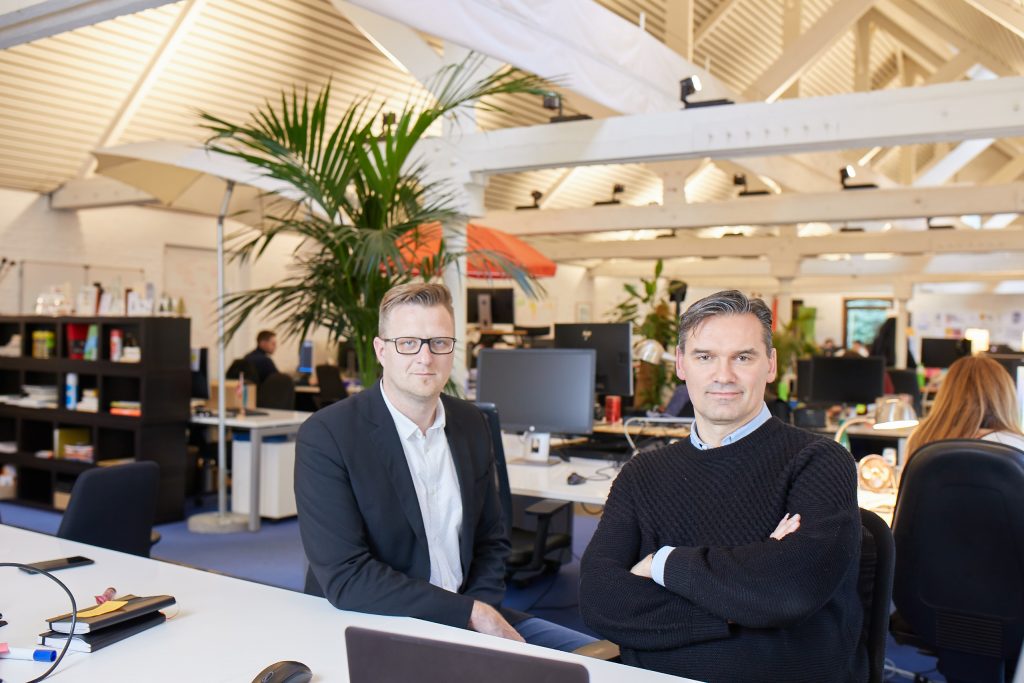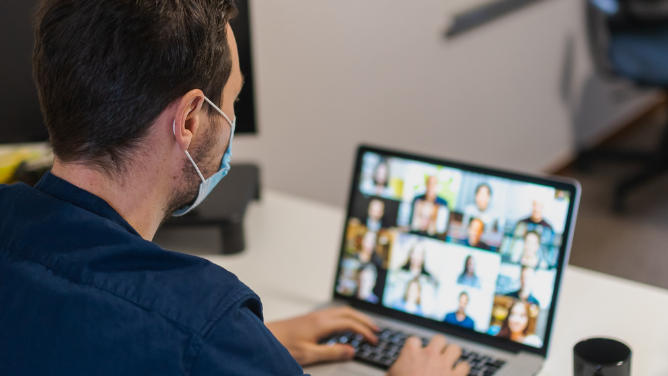Post-Covid work: how Emakina.BE intends to become “the place where you want to come to work”
Tim Wolfs and Pierre Pôlet co-manage Emakina in Belgium. As the end of the pandemic seems to take shape, they tell us more about their vision of work in a post-Covid world. How did they experience the lockdown? What were the reactions of their clients and their teams in Brussels? Above all, what does daily office life look like in this new paradigm?
What does the post-Covid period, for which everyone is preparing around the world, mean? Returning full time to the office? Mark Kaslatter, Managing Director of the Austrian branch of the Emakina Group, thought it unlikely when we interviewed him last July. At the time, he spoke of “a hybrid model, combining remote and office work, at a pace that suits each individual”, but above all he affirmed a very strong postulate: “the workplace no longer matters in the new normal”.
As realities often differ from one country to another, the Managing Directors of Emakina Belgium, Tim Wolfs and Pierre Pôlet, wanted to complete these ambitious statements by adding a local nuance. Today, they share their thoughts after a year of remote work and at a time when the ‘post-Covid workplace’ is taking shape in future new offices in Brussels.

Interview with Tim Wolfs and Pierre Pôlet (Emakina.BE)
Let’s talk about this Covid period: what practices have been established and are here to stay?
Tim Wolfs: We already had a policy of teleworking once a week, but the outbreak of the pandemic on 13 March 2020 made it necessary for us to switch immediately to 100% teleworking. We also had to set up collaborative tools very quickly. We didn’t have time to think and that’s when we realised we were in a particularly good position to act – without waiting – in the right way. The teams, I must stress, reacted admirably. To ensure cohesion, we systematised a daily check-in. This practice will undoubtedly continue.
Pierre Pôlet: Our teams had to learn how to work together, but remotely. Teleworking was still an individual exercise until then. Tim is right, the ability to adapt has been remarkable, thanks mainly to the implementation of these fantastic collaborative solutions. It may be insignificant, but we had to replace the Post-it notes in our workshops with a virtual solution. Once again, we were completely satisfied with the tools we found. We’re going to keep these workshops in digital format but keep a balance with the physical meetings. If we need to work with other countries and continents, the remote format is essential and works perfectly. Otherwise, we also want to encourage human contact. There’s something very strong about face-to-face meetings, especially for creative teams, such as those we have set up in Belgium.
As a manager, what did you miss?
Pierre Pôlet: As a manager, I missed not being able to talk face-to-face for a very long time. Direct contact was replaced by meetings. The good news is that we have gained in punctuality, but there’s a downside; the meetings sometimes take longer than they would in the office.
Tim Wolfs: I agree with that. For requests and agreements that can be made at the coffee machine or between two doors, a call is now required. Micro-decisions are converted into meetings and our agendas have exploded. On the other hand, I need to mention that the feeling of an ‘empty office’ is not the soul of a creative agency. But we have overcome this.

Were the clients just as quick to grasp things?
Tim Wolfs: Not always. Some of our clients, especially in the automotive industry, had to close their doors. In the first three months we saw a drop in the amount of work. That said, others very quickly took advantage – for example, KitchenAid, which saw a growing interest in home cooking during lockdown. Little by little, a whole series of sectors understood that there was a historic opportunity to position themselves to support their business. 2020 was manageable in the end.
Pierre Pôlet: Some clients took two months to react, often because their sector of activity was affected by the crisis. They wanted to observe before acting and we understood that. That’s also when they realised that we could help them accelerate their growth, in a totally new context. We helped them through this change, we supported our clients.
Did your teams suffer from the isolation caused by the lockdown?
Pierre Pôlet: I would be lying if I said otherwise. But to find out, we conducted internal investigations very quickly to check on our teams, especially from a psychological point of view. It was not easy for everyone, especially for those who were in lockdown in their homes with children. We kept in touch with them not only to strengthen cohesion, but more importantly to check on them.
Tim Wolfs: Pierre is absolutely right, we felt that things weren’t always easy for our staff. Let’s face it, some were in psychological distress. Our role as managers was to listen and to support. We also took very concrete measures to provide them with good working conditions, such as ergonomic chairs and screens. Our offices remained open, with an accessible reception and IT department, just as we as managers, were.
Can we already talk about a return to normal in Belgium and Brussels?
Tim Wolfs: Not yet. The context in Brussels is unique, as the vaccination rate is struggling compared to other regions of the country. We can’t talk about a full return to the office yet. We have communicated with regard to a guidance model to be implemented once the authorities no longer favour working from home. The initial feedback has generally been positive; we want our teams to come to the office at least six times a month (note that I’m not talking about days, but times).
Pierre Pôlet: Yes, although the issue of efficiency is no longer in question. We know it’s perfectly possible to work remotely, but we want our teams to continue to meet regularly – if only to give free rein to informal personal and professional exchanges that often give birth to brilliant ideas. Here again, what makes us special at Emakina.BE is our strong commitment to creativity and design.

The workplace will change: how are things shaping up at Emakina.BE?
Pierre Pôlet: Yes, the workplace has evolved and will continue to evolve. We have turned our offices into collaboration zones. We’re trying to expand the conviviality areas in the same spirit. If you need to concentrate, we have focus areas that look like libraries. Other areas are more dynamic, where people co-create in groups. The workplace must be somewhere that people want to come to, that’s the big lesson, and it guides our thinking for the future.
Tim Wolfs: Our creative activity is our central concern. It’s precisely this that differentiates us from other Emakina agencies around the world. We now have 250 people, of whom about fifty are based remotely (Switzerland, Great Britain, Serbia, South Africa, Lebanon, Poland, Turkey), but our Belgian teams must be able to benefit from an inspiring place that can catalyse creativity and design. A place like this – where people want to come back to work – is both an exciting challenge and a historic opportunity to rethink our physical working environment, whilst recognising that remote working is now clearly part of the new normal.
Interview by Cédric Godart on 19 September 2021.
Our recent blog posts
See all blogs-
How is AI’s synthetic data enhancing User Experience Research? Technology

-
Web3.AI Rising : How new technology can add value to your business

-
How generative AI helped us create an e-commerce app – with personalised content – in just 2 weeks Technology

-
Can you build a foodie app in 3 days using Generative AI? (Spoiler alert: yes!)

